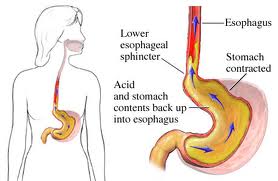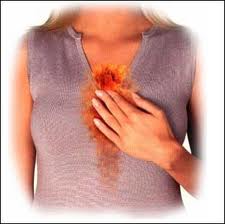Gastro-esophageal reflux disease or acid-reflux disease is a condition in which the contents of the stomach reflux backwards into the esophagus (food pipe). Since the stomach contents are acidic in nature, this damages the inner lining of the food pipe and causes symptoms of heartburn, pain, etc.

Causes
There are multiple causes responsible for initiating GERD, and different causes may be functioning in different individuals or even in the same individual at different times. The commonest causes responsible for GERD have been listed below:
Functional abnormalities of the lower esophageal sphincter
- Abnormally weak contractions of the sphincter
- Abnormal relaxations of the sphincter
Both of the above contribute to increases chances of backflow of the stomach contents into the esophagus
Hiatus Hernia:
A condition in which there is protrusion of the stomach up into the opening normally occupied by the esophagus in the diaphragm [the muscle that separates the chest (thoracic) cavity from the abdomen]
There are several other contributing factors for GERD which are as follows:
- Dietary habits: Fatty and fried foods, chocolates, garlic and onions, drinks with caffeine, acid foods such as citrus fruits and tomatoes, spicy foods, mint flavorings, pungent foods, etc

- Habits: Use of alcohol, cigarettes; poor posture (slouching) especially after meals
- Drugs: Calcium channel blockers, antihistamines, theophylline, nitrates,
- Eating habits: Large meals, eating soon before sleeping
- Other contributory conditions: Obesity, pregnancy, diabetes, rapid weight gain, etc.
- Stress: Though this has not been directly linked to GERD, most patients report an increase in their symptoms during stressful times.
- Other medical conditions: Diabetes, pregnancy, Obesity
Symptoms
Uncomplicated GERD presents with the following symptoms commonly:
- Heartburn: This is the commonest presentation of GERD. Patients often complain of burning pain in the middle of chest region (retrosternal). The pain may also be present in the upper part of the abdomen and sometimes travels up to the throat. Occasionally the pain may be sharp or pressing instead of burning. The pain is worse after meals and can last upto a couple of hours. Symptoms may be worse on lying down.
- Regurgitation: The refluxed stomach contents may come into the throat or mouth and this may occur especially on bending or sleeping. There may be a feeling of ‘something stuck in the throat’.
- Dry cough, hoarseness of voice, bad taste in the mouth are other symptoms caused due to the regurgitation of the food.
- Occasionally patients may develop nausea (though this is not very frequent) and GERD should always be considered in patients who have unexplained nausea.
- In children, the common symptoms are vomiting, coughing and other respiratory problems
Lifestyle Changes
Patients of GERD can benefit immensely if they follow the following set of instructions and incorporate these into their daily lives. These changes in lifestyle can bring under good control most of the symptoms of GERD and can significantly alleviate the symptoms of GERD.
- Don’t eat at least 2-3 hours before bedtime. This will help emptying of the stomach before the person goes into the reclined position and will prevent the reflux.
- Don’t lie down right after eating at any time of day.
- Keep the head end of your bed elevated by at least 6 inches with blocks because gravity helps in preventing the reflux of the acid from the stomach.
- Don’t eat large meals; instead opt for smaller, more frequent meals throughout the day.
- Give up smoking because smoking weakens the lower esophageal sphincter and increases reflux.
- Avoid alcohol because it increases the likelihood that acid from your stomach will back up.
- Reduce your weight if you are overweight because obesity increases the chances of reflux of the acid.
- Avoid fatty, greasy foods, chocolate, caffeine, spicy foods, citrus foods and other things which worsen your heartburn.
- Avoid remaining in stooped posture; keep an upright posture when standing or sitting.
- Be cautious with over-the-counter painkillers as these might worsen your complaints, always ask your physician before taking any such medication.





